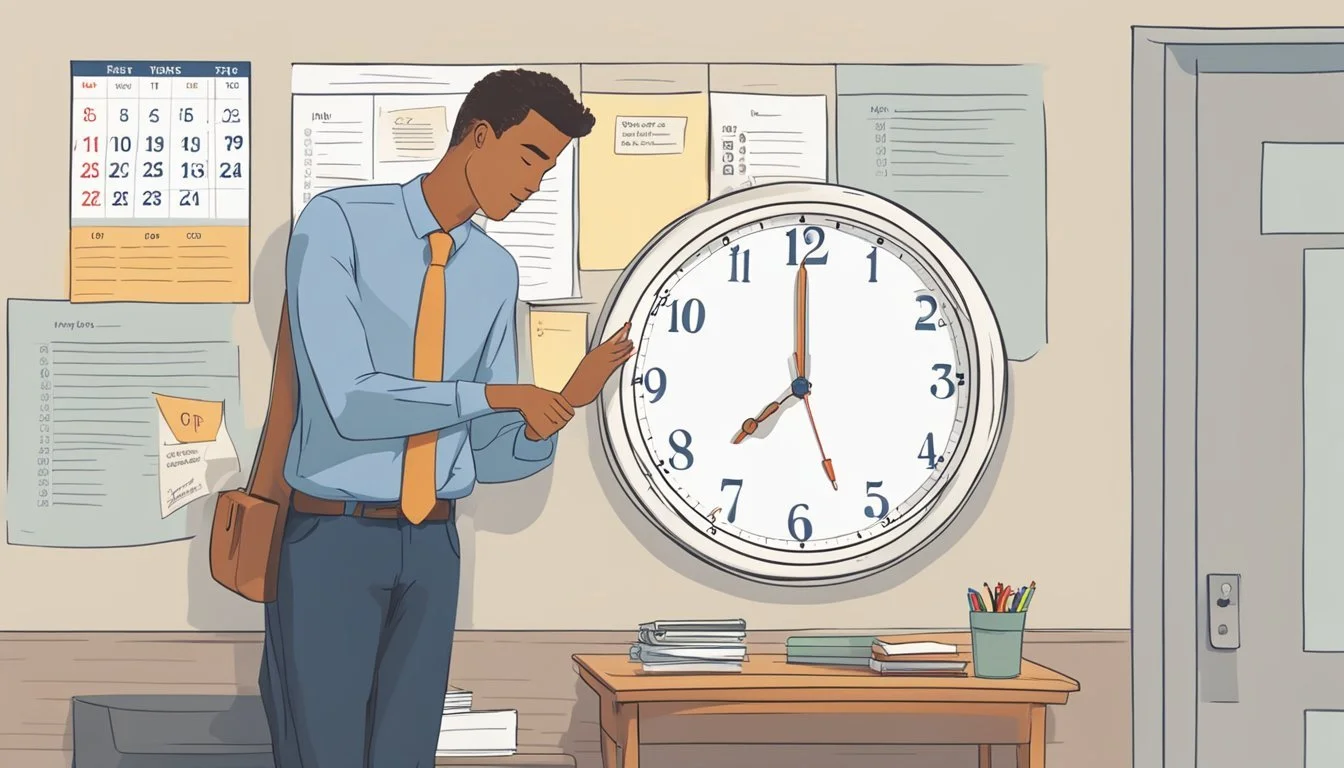7 Strategies for Handling a Friend Who's Always Running Late
Practical Tips
Dealing with a friend who is always running late can be exasperating, but it’s a common issue that many face. Whether it’s consistently showing up late to events or always missing agreed-upon meeting times, this habit can strain even the strongest of friendships. Understanding how to manage this situation effectively is crucial for maintaining a positive relationship.
Effective strategies can ease the frustration and help both parties find a workable routine. It's important to consider approaches that respect your time while also taking into account your friend’s challenges. By addressing the issue with empathy and clear communication, you can foster a healthier dynamic.
1) Set a Specific Meeting Time
Agreeing on a specific meeting time sets clear expectations. Instead of saying "meet in the afternoon," opt for "meet at 3 PM." This clarity leaves no room for misinterpretation.
Consistency is key. Establish a regular time for recurring meetups. A routine can help a chronically late friend adjust their schedule accordingly.
Send reminders. A friendly message the day before or an hour ahead can prompt timely arrivals. Use digital calendars with alerts to keep everyone on track.
Always start on time. Even if the friend isn't there, beginning as planned reinforces the importance of punctuality. Gradually, they may recognize the value of being prompt.
A specific start time also helps you manage your own time better. Knowing exactly when the meeting begins allows for more efficient planning and reduces frustration.
For more tips on managing lateness, read 10 Ways to Survive Meetings with Difficult Colleagues. Setting precise meeting times can significantly improve both personal and professional encounters.
2) Communicate Your Expectations
Clear communication is crucial when addressing a friend's chronic lateness. Tell them how their behavior affects you. Politely but firmly express your feelings.
Share the importance of punctuality to you. Explain that being on time is an expression of respect. This may help them understand your perspective.
Set realistic expectations. Let your friend know what you need from them. Specify the acceptable amount of tardiness. For example, a five-minute delay might be tolerable, but twenty minutes is not.
Discuss consequences clearly. Mention what will happen if lateness continues. It could be something like leaving without them or starting without waiting.
Encourage your friend to use tools for better time management. They might benefit from reminders or calendars, as noted here.
Make your communication direct yet compassionate. Avoid blame; focus on finding solutions together.
Be patient and open to feedback. Your friend might have reasons for their behavior. Understanding both sides helps create a more effective approach.
3) Offer Friendly Reminders
Gently reminding a chronically late friend about upcoming plans can be very effective. Sending a text message or making a quick phone call a few hours before meeting can help them remember.
It's important to keep the tone light and friendly. A simple reminder like, "Looking forward to seeing you at 3 PM!" can be enough to jog their memory.
Use tools like calendar apps to set reminders for both yourself and your friend. Sharing event details can help ensure they remember the time and place.
If lateness is a frequent issue, consistent reminders can create a routine. This consistency can help them develop better time management habits.
Reminders should be considerate, not nagging. The goal is to help, not to scold, which can be counterproductive.
By offering friendly reminders, you're showing that you care about the meeting and their involvement, which can encourage punctuality without creating tension.
4) Lead by Example
One effective way to address a friend's chronic lateness is to lead by example. Punctuality demonstrates respect for others' time and establishes a standard in your social circle.
Always show up on time for your meetings or gatherings. It reinforces that being punctual is important to you.
When organizing events, communicate clear start times and adhere to them. This consistency can subtly encourage others to follow suit.
If you see positive changes in your friend's behavior, acknowledge and appreciate their effort. Positive reinforcement can be a powerful motivator.
In work contexts, set the tone by beginning meetings promptly, regardless of whether everyone has arrived. This action highlights the value of punctuality and can encourage habitual latecomers to adjust their behavior.
Avoid making exceptions for tardiness. Instead, keep progressing with your activities as planned. Over time, this may create a natural shift towards punctuality in those around you.
Encourage friends or colleagues to plan ahead, sharing tips on how to avoid common obstacles that lead to being late. Lead by providing solutions, not just by pointing out problems.
By embodying the values of timeliness and preparedness, you can influence others to adopt these habits. This approach fosters a considerate and efficient environment in both personal and professional settings.
5) Suggest Time-Management Tools
One effective way to help a friend who's always late is by suggesting reliable time-management tools. These tools can offer practical solutions to improve punctuality.
Digital calendars such as Google Calendar or Outlook are excellent ways to manage appointments and set reminders. They sync across devices, providing flexibility and accessibility.
Suggest using a task management app like Todoist. These apps can help break down tasks into manageable steps, allowing users to prioritize effectively and avoid missing deadlines.
Time-tracking apps like Toggl can provide insights into how your friend spends their time daily. This can help identify areas where they are losing time and make necessary adjustments.
For more advanced needs, project management tools such as Trello can be beneficial. They allow users to plan projects visually, set deadlines, and collaborate with others.
Remind your friend about the importance of setting alarms or timers. Simple tools like these can act as prompts to start wrapping up a task and move on to the next.
Encourage exploring different tools to find the one that best fits their workflow and preferences. Effective time management can greatly reduce instances of lateness and improve overall efficiency.
6) Practice Empathy and Patience
Understanding a friend's chronic lateness can alleviate frustration. Empathy involves trying to see things from their perspective. Maybe they struggle with time management due to a busy schedule or personal challenges. Recognizing these factors can shift your mindset from irritation to compassion.
Active listening plays a key role in practicing empathy. When discussing the issue, listen attentively to their reasons without jumping in with judgments. Reacting with understanding can foster a more open and productive conversation.
Patience is essential. Accept that habitual lateness might not change overnight. Practicing patience helps maintain a positive relationship, even when plans don't go smoothly. A calm approach avoids adding tension and keeps interactions respectful and kind.
Gentle reminders can be helpful assets. Friendly texts or calls before meeting times can serve as non-confrontational nudges, reminding them of the appointment without adding pressure.
Remember, patience and empathy are fundamental to maintaining healthy relationships. Showing understanding towards a friend's consistent tardiness can strengthen your bond and contribute to a more harmonious connection.
Focusing on the aspects within your control, rather than their punctuality, helps in managing expectations. Keeping the bigger picture in mind, these qualities promote a more relaxed and supportive dynamic. For more insights on developing empathy, check out this helpful resource.
7) Plan for Buffer Time
Planning for buffer time means anticipating that your friend might be late and adjusting your schedule accordingly.
Add an extra 15-30 minutes to your timeline. This can reduce stress and eliminate frustration if your friend does not arrive on time.
Use this buffer time productively. Bring a book to read or catch up on emails while you wait.
Consider setting appointment times earlier than necessary. If your friend is consistently 15 minutes late, suggest meeting 15 minutes earlier than you actually need them there.
This approach can also apply to important events. For significant occasions like catching a flight, let your friend know the departure time is earlier.
Inform your friend about buffer time adjustments. Transparency can promote understanding and improve punctuality.
Evaluate the effectiveness of buffer time periodically to gauge if adjustments are needed.
Understanding The Root Causes
People who are consistently late often grapple with a range of psychological and environmental challenges. These factors can significantly impact their time management and perception of deadlines.
Psychological Factors
Time Perception: Individuals with poor time perception can find it difficult to estimate how long tasks will take. Known as time blindness, this condition can lead to consistent tardiness due to underestimating the time needed for activities.
Personality Traits: Optimistic or impulsive personalities often exhibit a relaxed attitude toward deadlines. These individuals might believe they can accomplish tasks faster than they actually can, which leads them to start tasks later and end up running late.
Procrastination: Chronic procrastinators delay tasks, hoping to accomplish them quickly later. This habit can become a significant issue, making it hard for them to adhere to schedules.
Environmental Influences
Disorganization: When a person's surroundings are chaotic or poorly organized, it affects their ability to manage time effectively. For instance, if someone’s house is disorganized, finding necessary items can take extra time, resulting in lateness.
External Disruptions: Distractions from other people or external events can cause interruptions, leading to delays. For example, family members needing assistance at the last minute or urgent, unexpected events often derail even the best-laid plans.
Lack of Tools: Some individuals may not have the proper tools to keep themselves on schedule. Utilizing alarms, planners, and reminders can aid in overcoming these obstacles and ensuring punctuality.
Understanding these underlying causes can help in developing strategies to handle and perhaps even alter the behaviors that lead to chronic lateness.
Effective Communication Techniques
Utilizing effective communication techniques can make a significant difference when addressing a friend's chronic lateness. Key strategies include selecting the optimal time and place for discussions and communicating assertively.
Choosing The Right Time And Place
Select a moment when both parties are relaxed and not preoccupied. Avoid bringing up the topic during stressful situations or in the midst of an argument.
Consider private settings where the conversation can flow without interruptions. Public places with minimal distractions, like a quiet café or a park bench, can be effective for ensuring focus.
By establishing a calm environment, the chances of a constructive and clear dialogue increase. This approach helps both individuals feel valued and respected, making it easier to address sensitive issues like chronic lateness.
Using Assertive Communication
Assertive communication involves expressing one's feelings and needs clearly and respectfully. Start by stating how the friend's lateness affects you personally, using "I" statements to avoid sounding accusatory.
For example, say, "I feel disrespected when you are late," rather than, "You are always late." This approach focuses on expressing emotions without placing blame.
Encourage open dialogue by inviting the friend to share their side. Active listening can foster mutual understanding and lead to finding a solution that respects both parties' needs. Maintaining a calm and steady tone reinforces the seriousness of the conversation without escalating tension.
Long-Term Solutions
Consistent tardiness can strain friendships, so implementing long-term solutions is crucial. Establishing firm boundaries and supporting the development of positive habits can help manage chronic lateness effectively.
Setting Boundaries
Setting clear boundaries can help manage the frustration caused by a friend's constant lateness. Begin by communicating how their behavior affects you. Use specific examples to illustrate the inconvenience and stress it causes.
Offer concrete consequences for continued lateness. For example, state that if they are late to a movie, you will leave their ticket at Will Call and go in without them.
Another approach is to give a buffer time for meetings. If the agreed time is 7:00 PM, tell them it's 6:45 PM. This way, they are more likely to arrive closer to the actual time.
By setting boundaries like these, you take control of your schedule and reduce the impact of their tardiness on your life.
Encouraging Positive Habits
To help your friend improve their punctuality, encourage the development of positive habits. Suggest they establish a "key things" spot in their home where essential items are kept. This reduces time spent searching for keys, wallets, and similar items before leaving.
Recommend they plan the night before. Packing bags, laying out clothes, and ensuring all necessities are ready can drastically cut down preparation time.
For more ingrained behavioral change, suggest they adopt time management techniques. These can include setting alarms and reminders or using apps designed to track and manage time effectively.
By promoting these positive habits, you can help your friend become more reliable and punctual.







